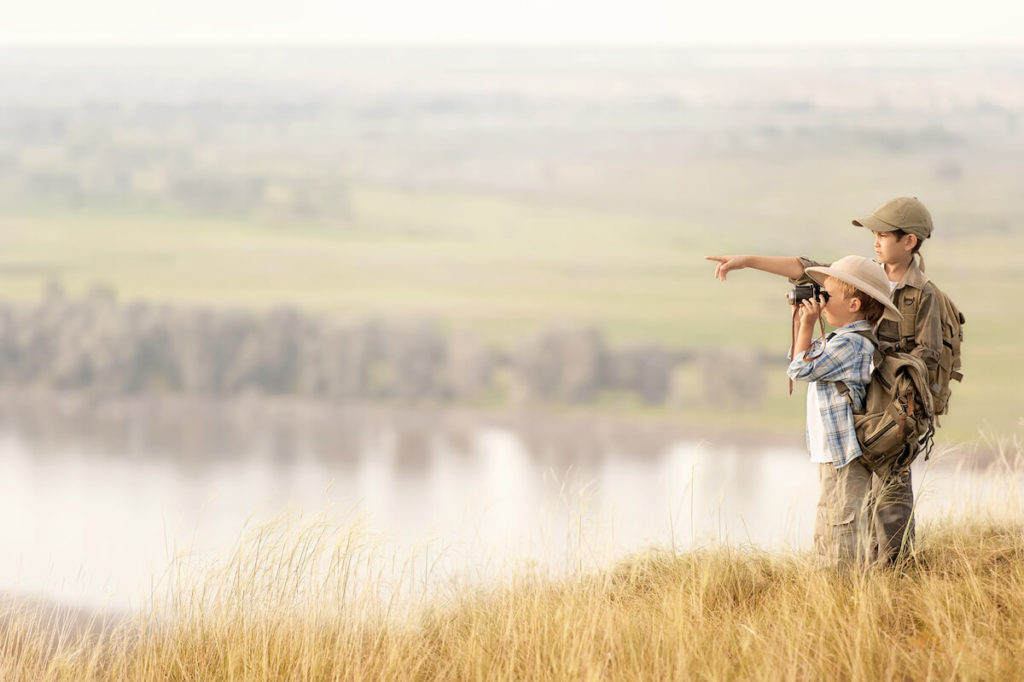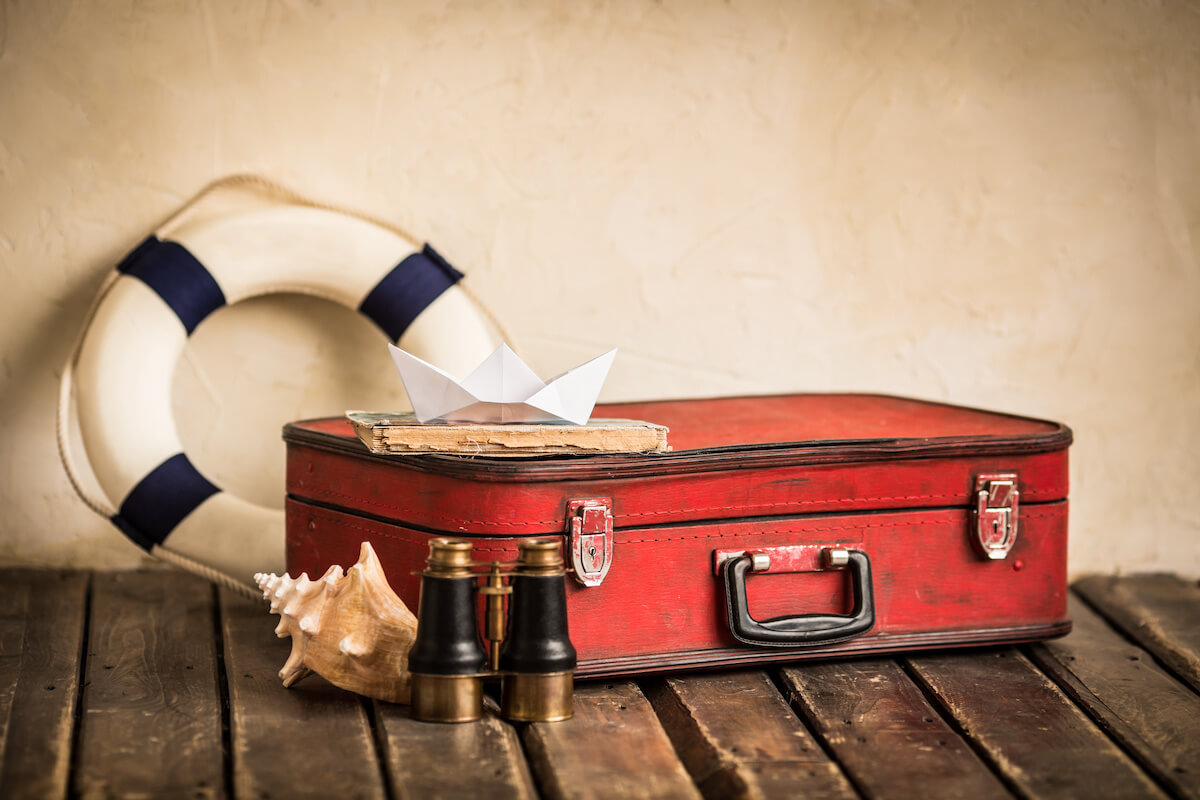Bon Voyage: Taking School Along on Travel
By Vicki Pitts
Incorporating travel into your curriculum adds a unique experience of adventure and excitement to your homeschooling! You can supplement any subject and cater to any interest. Who else gets to enjoy their school while participating in a mission trip or boating on a canal, riding a camel, or zipping through the country on a train? What other kids get to travel to archaeological sites, experience eighteenth-century life, or follow in the footsteps of their favorite historical character as part of their school day? Who else gets to travel during off-peak months, taking advantage of great deals. You are a homeschooler. You are in charge of your curriculum and your schedule; you have flexibility and authority—take advantage of it! Yes, you will spend time and money, but dismiss your apprehensions for the next ten minutes and read on.
GO ON DAY TRIPS
Think about starting with day trips. Virginia is full of historic sites, world-class museums, and beautiful scenery, and there are many free resources available that will enable you to gain experience and confidence before you embark upon something more extensive. Consider the interests of your children and how to get them involved. Do you have an aspiring event planner or communications major? Get him engaged in planning the logistics or making the reservations.
My oldest daughter and her four homeschooled children regularly take advantage of local nature centers, museums, farms, concerts, historical sites, national monuments, parks, theater, etc.
For example, did you know that there is a government initiative called “Every Kid in a Park” that gives families of fourth graders a free yearly pass to our national parklands? Check it out at everykidinapark.gov. My daughter’s family has jumped on the bandwagon, and the kids are earning Junior Ranger badges.
The family also attends their free community concert series, using it for “music appreciation class.” These one-hour concerts are a perfect length for little ones and create opportunities for conversation about what the children enjoyed about the program, what instruments were their favorites, what they might like to learn to play, and what music styles they noticed.
Travel Creates Opportunities for Conversation
The Children’s Science Center in Fairfax is another of their favorite places. It is not free, but the family receives an annual pass as a Christmas gift. The lab encourages STEM learning, and the kids enjoy the changing experiments and other visual/manipulative educational play spaces. Even a trip to the dentist can elicit conversations about chemistry, medicine, responsibility, hard work, importance of education, and so much more. Just engaging your kids in conversation during every trip creates educational moments.
You are a homeschooler. You are in charge of your curriculum and your schedule; you have flexibility and authority—take advantage of it! Yes, you will spend time and money, but dismiss your apprehensions for the next ten minutes and read on
For more ideas of day trips, look at Kids Love Virginia by George and Michele Zavatsky and One-Day Trips Through History by Jane Ockershausen.


TAKE A CROSS-COUNTRY TRIP!
Westward Ho! I would imagine your kids could get on board like mine did when we organized a month-long cross-country trip in 1996. In order to make the trip more affordable, we took advantage of all the free activities at national parks. Careful planning and intentional financial management paid huge dividends, especially when we needed car repairs on our second day of travel and had to take care of an abscessed tooth in a 1950’s dental office!
Some of our vivid memories in Colorado include visiting Whit’s End at Focus on the Family and see wildlife right in their own habitats and experience new modes of transportation— maybe a speed train, double-decker bus, or homemade canoe.
You might see grand architecture, gothic arches, mosaic-plastered walls, pagodas, or little mud huts. You might enjoy the sweet, earthy fragrance of newly woven baskets; the spicy smell of curries; or the woodsy aroma of incense in a church or market. Maybe you’ll stroke soft clothing made from alpaca hair or Merino wool—or maybe you’ll even rub the muzzle of a giraffe in a wildlife rescue. Dinner might be smoked fish, vegetable tempura, wildebeest steak, or sweet and sour dumplings.
How thrilling to hear the oompah-pah of accordion music, intense strumming of Flamenco guitar, or the beat of drums! Try sleeping in a hammock or under a mosquito net. You might even adapt to the “freedom” from technology due to limited access to phone and Internet. Most assuredly, you will gain a new appreciation for America!
Travel to Other Countries
Traveling abroad is eye-opening in other ways, too. It affords us the chance to learn about other faiths and how they are woven into the culture, and it gives us the opportunity to appreciate similarities and differences between ourselves and others.
For example, here we greet people with “Hello,” but in Austria I was enthusiastic about greeting every person I encountered with their traditional “Grü. Gott.” (“May God greet you.”) Language is formal in Spain, but in Mexico, our fifteen-year-old son connected with the kids on the soccer field by dropping formal Spanish. In many other countries outside the United States, people are more important than the to-do list or the schedule, and socializing occurs on the streets and in the plazas rather than the home, which is generally an apartment. Dress is typically more formal in other places than here. This was strikingly so in India, where I quickly realized that a skort was inappropriate. All first-hand observations like these create a lasting impression, whereas reading the information in a book may not.
Once back on American soil, our experiences can help us show empathy to first-generation Americans in our neighborhoods and churches, thereby building bridges for sharing Christ. It may even encourage a desire to serve internationally.
Travel and Language
As a language teacher, I place a high value on learning a second language. By visiting a foreign country instead of just learning the language in the classroom, we can observe how the language and culture mesh. When we speak their language, we can much more easily interact with the local people and learn of their joys and struggles. If your children have been studying a foreign language, perhaps their schooling could include helping to plan a trip to a corresponding country and journaling in that language while they are there.
For tips on saving money, and logistics for travel, read Have Kids — Will Travel by Dale and Michelle Bartlett. For information about each country and suggested sites to visit, get The Rick Steves guidebooks. STAY SAFE!
Of course, in these days there is the question of safety. Safety is not guaranteed even in our own neighborhoods, and when we consider security during travel as well as in our hometowns, common sense is the key. Avoid places where there is unrest or where the State Department has issued a warning. Purchase travel insurance. Stay in groups, or organize a buddy system. Stay alert.
CONSIDER AN ORGANIZED TOUR.
You may want to investigate a tour company, especially if you are traveling to another country. A huge benefit of an organized tour is maximization of time in the country. For example, there is no difficulty in locating a museum and no precious time lost waiting in line at palaces or museums, choosing a restaurant, or understanding the train schedule and making arrangements. Everything is planned, and you skip the lines.
A tour company handles all logistics, driving, reservations, and more, eliminating much of the work as well as providing an excellent educational experience.
Tour companies closely monitor the situation in any country where they conduct tours and can give you peace of mind regarding safety issues. And when an unexpected situation arises—as it did for my group in 2011 when we could not get back to Spain from Morocco because of inclement weather—your tour director will arrange for dinner and a hotel. I am thankful this responsibility did not fall on my shoulders. A tour can be pricier—but not always—so check out all your options. Any extra expense might even be worth it, especially for the beginning traveler or those who would appreciate the convenience.
HAVE YOUR KIDS EARN SCHOOL CREDIT.
Our children didn’t receive formal credit for our trip out West; however, if you plan your own curriculum, you can give your kids credit for their related assigned reading, projects, and papers. Having your students do some initial research and then write about their experiences will also help enhance the learning process. Some tour companies such as Education First provide the opportunity to earn high school or college credit for projects approved and begun prior to travel.
TRAVEL BROADENS YOUR KIDS’ HORIZONS.
Want to stretch your ability to be spontaneous? Want to add some adventure and excitement to your curriculum? Think outside the box and add some real-world learning to your home school. Travel! You’ll make memories to last a lifetime, and you’ll never regret it!
About the Author
Vickie Pitts homeschooled her five kids and still teaches homeschool Spanish classes. She loves Spain and Spanish speaking people and their culture, and she warns her students that her goal is for them to love all things Spanish, too. Vickie travels to Europe with Education First tours.









